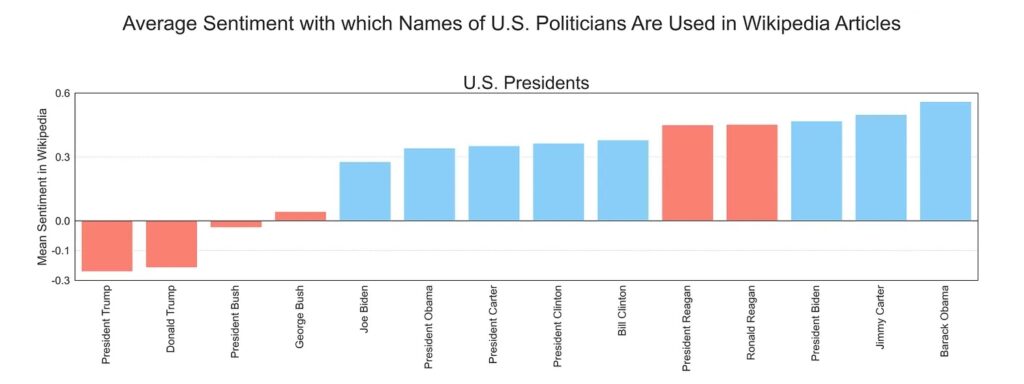From suspicious donation pleas to censorship drives, Wikipedia has long carried out much of its business in the shadows. Now, a new study has provided further evidence for a widely-held hunch: that the site carries a clear political bias.
Researcher David Rozado has written a piece, complete with numerous illustrative charts, arguing that Wikipedia has a Left-of-centre slant when discussing politicians and politicised organisations. Examples include the average sentiment with which US Presidents are described in articles on the site, as well as the application of terms such as “far-Left” and “far-Right”.
 “These results,” Rozado writes, “suggest that Wikipedia’s neutral point of view policy (NPOV) is not achieving its stated goal of viewpoint impartiality in […] articles.” Given that Large Language Models (LLMs) are trained using Wikipedia pages, among other sources, this could have broader implications for AI too. Maybe school teachers are right to warn that it isn’t a reliable source…
“These results,” Rozado writes, “suggest that Wikipedia’s neutral point of view policy (NPOV) is not achieving its stated goal of viewpoint impartiality in […] articles.” Given that Large Language Models (LLMs) are trained using Wikipedia pages, among other sources, this could have broader implications for AI too. Maybe school teachers are right to warn that it isn’t a reliable source…

 Main Edition
Main Edition US
US FR
FR





Join the discussion
Join like minded readers that support our journalism by becoming a paid subscriber
To join the discussion in the comments, become a paid subscriber.
Join like minded readers that support our journalism, read unlimited articles and enjoy other subscriber-only benefits.
SubscribeI guess you can make the argument that systemic racism may exist, even if its extent is exaggerated.
But systemic leftism, or systemic progressiveness, seems a far more likely social contagion. The people at Wikipedia, the BBC, the Civil Service, Academia and so on may be ‘guilty’ of systemic leftism – but not be aware of their bias. Isn’t that how the argument criticising systemic racism is justified?
Wow – stop the presses!
To get some serious reporting, check out Helen of desTroy (search for “Wikipedia”) or in German Wikihausen.de.
I assume this partiality / impartiality tilt is true, though bias either way generally reflects PoV as much as objective reality.
I don’t use Wikipedia for political viewpoints, and for factual stuff where necessary check other sources and follow links to verify.
But despite its faults, and provided one bears the possibility of bias in mind, Wikipedia is several orders of magnitude better and more useful than any other source on the internet, even more so compared to printed sources.
J